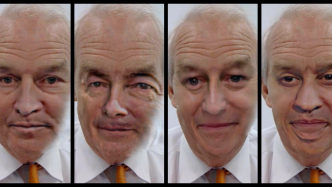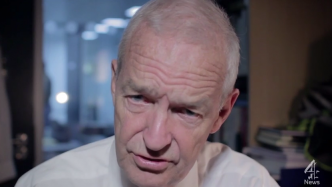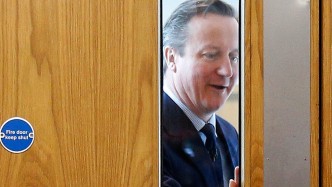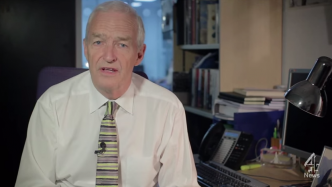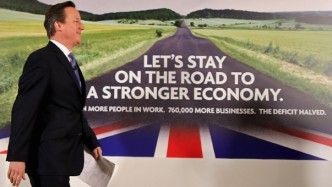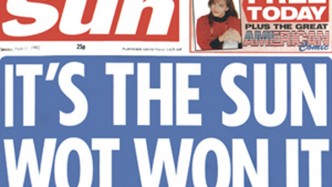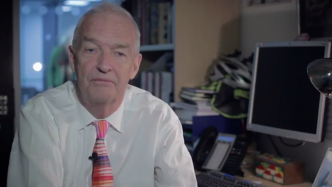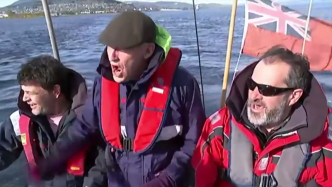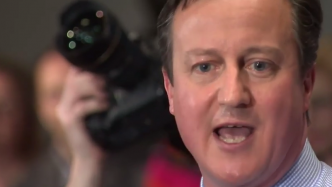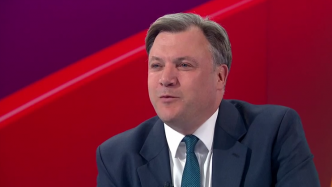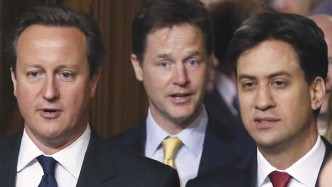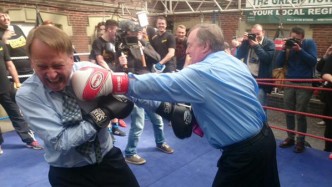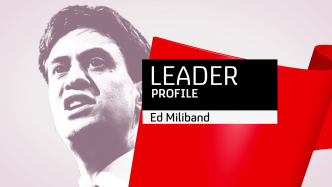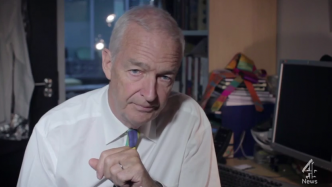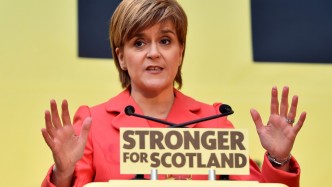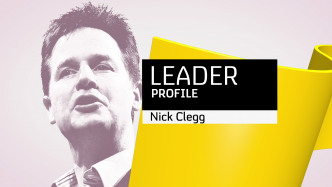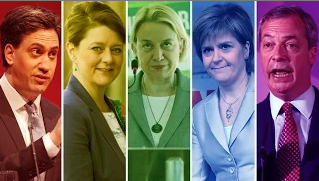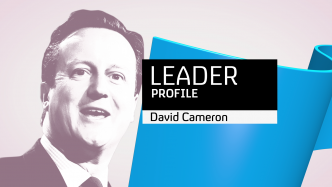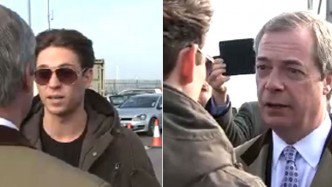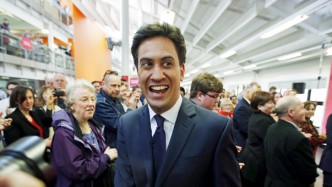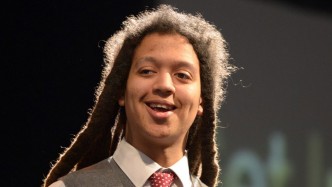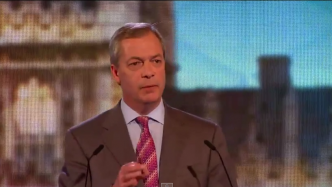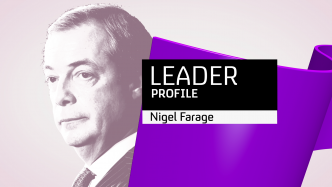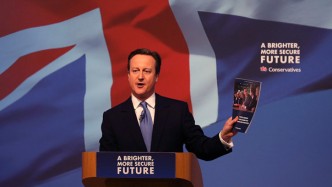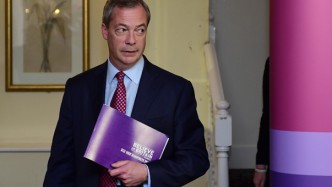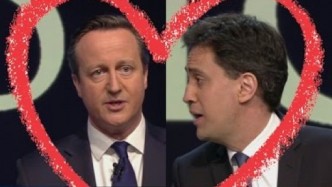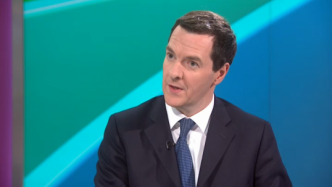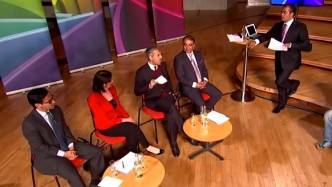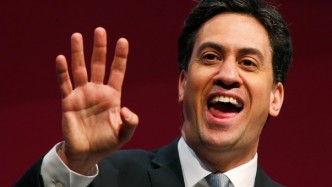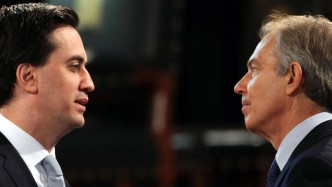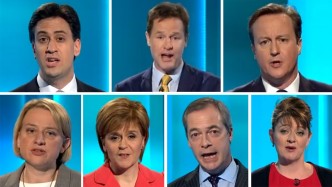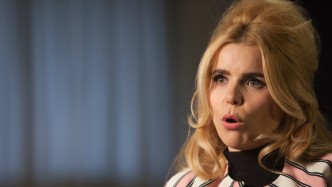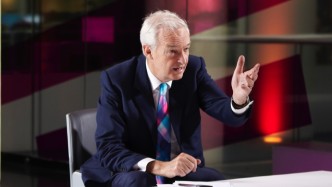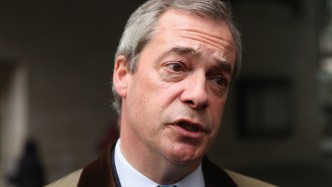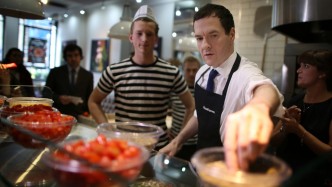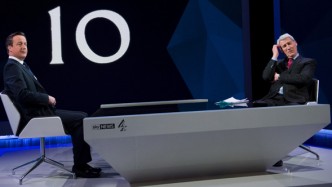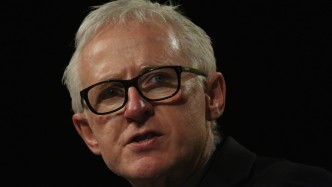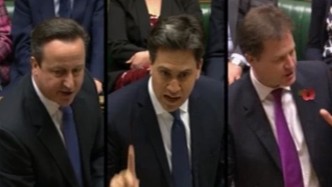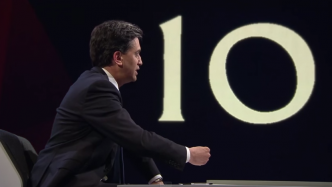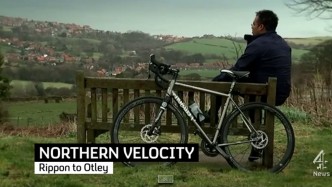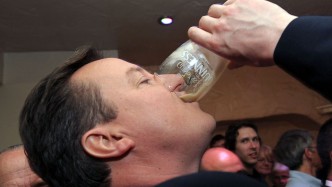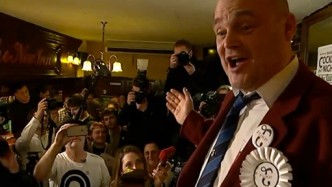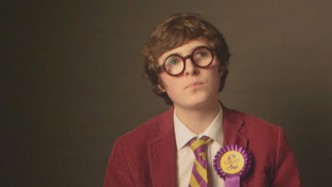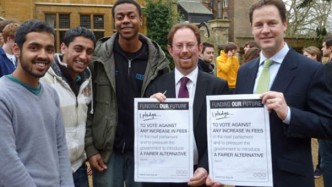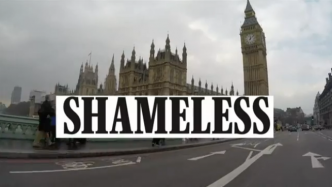15 April 2015
-
-
Nigel Farage: Ukip manifesto offers ‘serious policies’
Ukip’s manifesto offers “serious, fully-costed policies” for people who “believe in Britain”, Nigel Farage said as he prepared to launch the party’s manifesto.
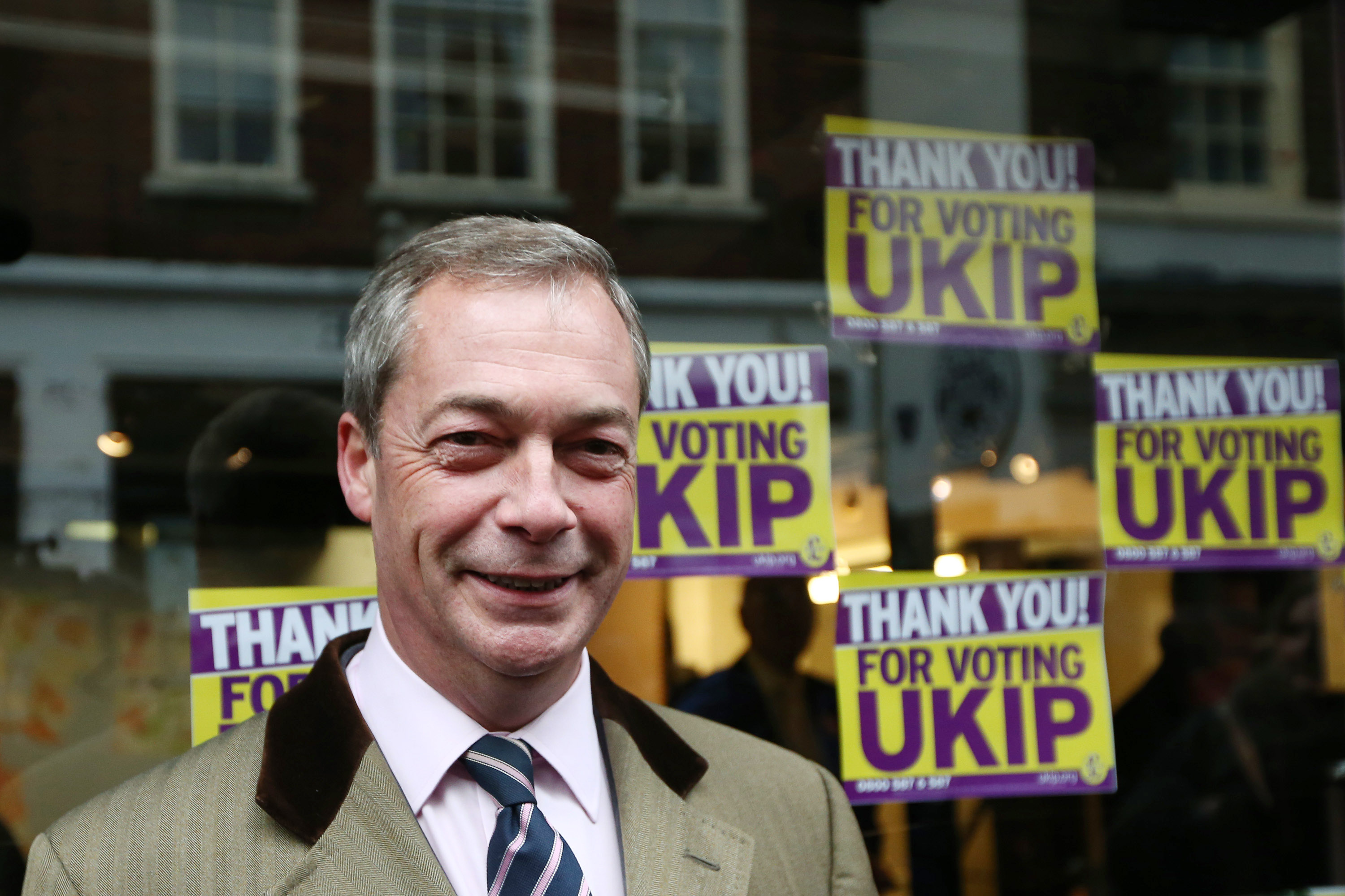
An in/out referendum on Britain’s membership of the European Union “as soon as possible”, a five-year ban on unskilled migrants coming in to the UK and a points-based system for others are among its key pledges.
But with the party keen to broaden its appeal and build on a surge which saw it win last year’s European elections, it offers boosts for first-time buyers, military veterans, small businesses and hospital patients.
-
Michael Gove: Tories’ have ‘win-win-win’ policy on housing
Last night, Tory chief whip Michael Gove told Channel 4 News that money from council house sales will be used to build more homes and transform brownfield land.
Mr Gove told Jon Snow: “If in 2010 we’d said that we were going to be able to invest an additional £7bn in the NHS, and take a significant number of people out of income tax, and reduce the deficit by a half, then I suspect that both of your eyebrows would have hit the roof.”
Discussing Conservative spending plans, Mr Gove said: “£4.5bn will be raised by making sure that we sell the most expensive council properties when they become vacant – and that money will be used not simply to enable people who are in housing association properties to buy their homes.
“It will also ensure that we build more affordable homes and we transform brownfield land which is currently not appropriate for building, so that we can ensure that there are even more homes which are constructed. So it’s a win-win-win policy.”
-
Liberal Democrats vow education boost
Nick Clegg is putting education at the centre of Lib Dem manifesto plans by promising an extra £2.5bn of spending on schools and colleges a year.
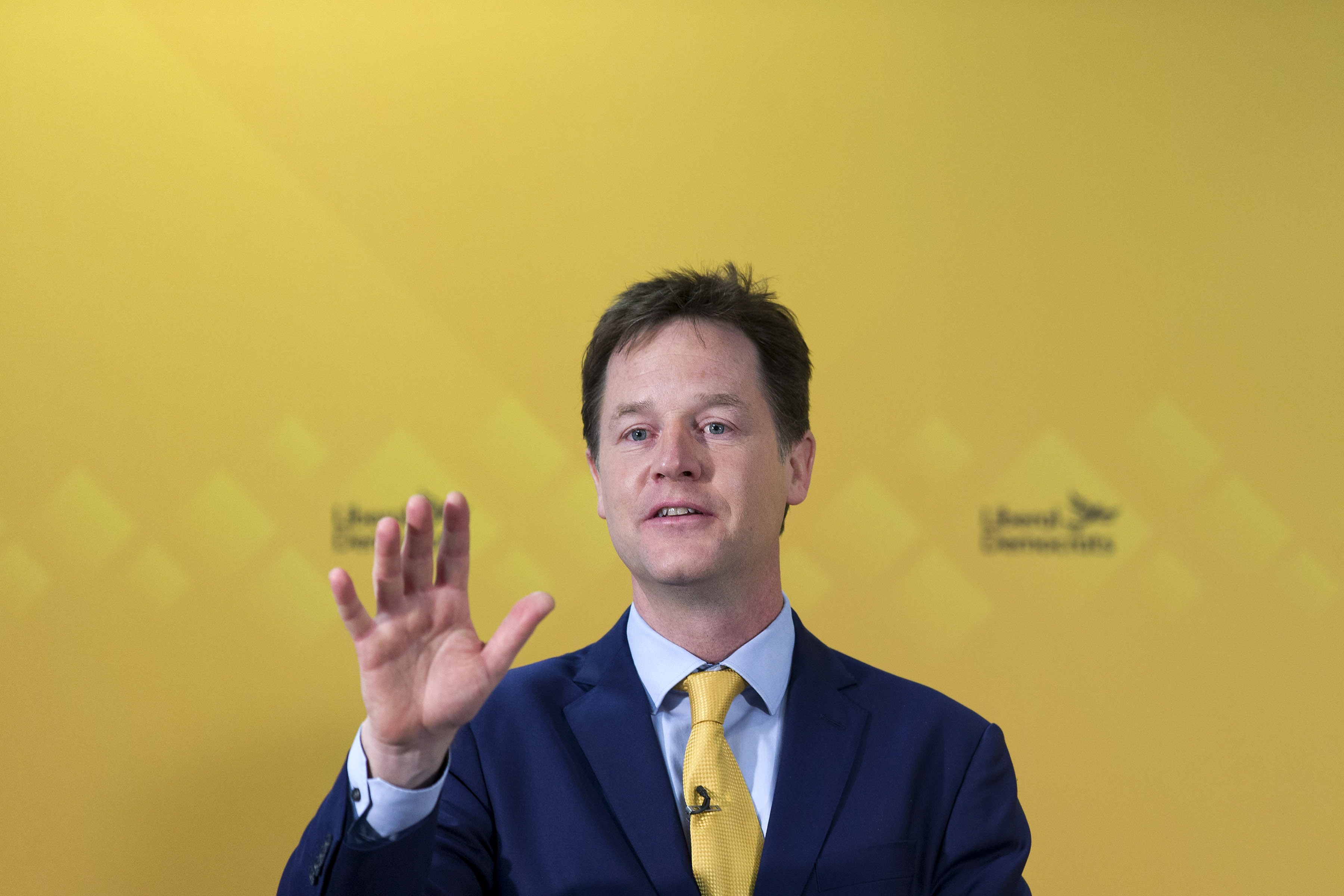
The plans would see the education budget for two to nineteen-year-olds in England rise to £55bn by the end of the parliament, protecting spending per pupil even as the number of children enrolled in classes increases.
The Lib Dem leader said: “The manifesto has one simple ambition and word at its heart: opportunity.
“It’s a very old, liberal idea, the idea that everybody should be able to live out their life to the full regardless of the circumstances of their birth, regardless of the income of their parents, regardless of where they come from.
“Education is the great liberator of people’s potential so we need to make sure we support the education system in the next parliament to give every boy and girl the chance to thrive.”
-
Nigel Farage: I would force David Cameron to spend ‘substantially more’ on defence
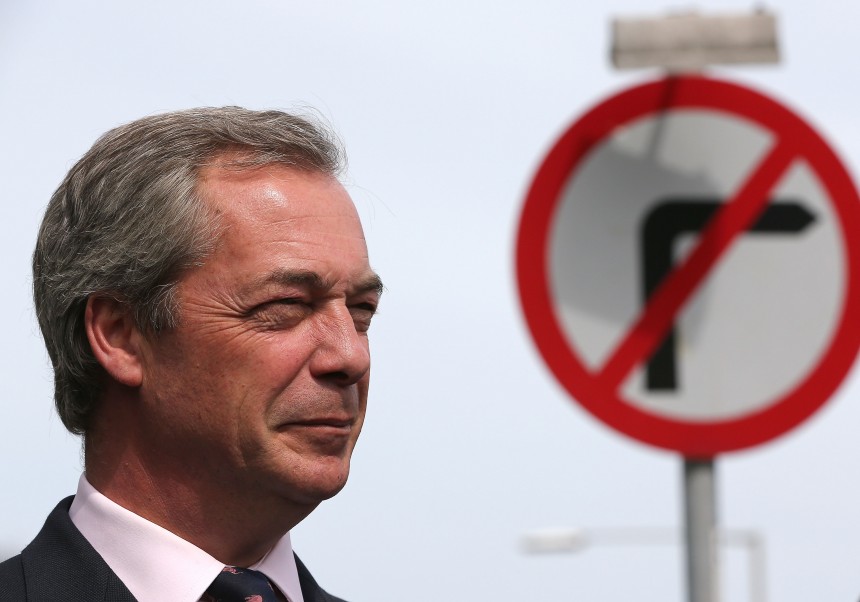
Nigel Farage campaigns in Clacton this week
Ukip are fighting this election on the back of a series of promises on defence spending.
Nigel Farage is making hay with the Conservatives failure to guarantee a two per cent spend of national income on defence and appealing to his core vote with popular, generous policies for the armed forces.
As well as a pledge to spend more than two per cent of GDP every year the Ukip leader has also promised that his party would deliver a dedicated military hospital and a series of financial incentives to help ex-servicemen and women get jobs in the civilian world.
His pledges this morning come against a backdrop of frustration from the Conservative right and senior army figures over David Cameron’s failure to guarantee the spend.
The Conservatives themselves have also attempted to paint Labour as weak on defence, questing Ed Miliband’s personal commitment to Trident.
This leaves space for Mr Farage and his party to say that it would be up to them, in a coalition, to ensure the armed forces are fully funded and protected.
Speaking in the Telegraph the Ukip leader said he would force David Cameron to spend ‘substantially more’ that 2 per cent of GDP on defence as part of any power sharing deal.
The Conservatives are likely to be unwilling to match such an expensive pledge even if they are required to turn to Mr Farage in an effort to form a government come May.
The paper also reports that the Ukip leader is planning to open “back channels” with the Conservatives to discuss a post-election pact a week before election day on May 7, a claim Labour have seized upon this morning as proof of a Conservative-Ukip pact.
-
Ukip defence pledges in full
Spending ‘substantially more’ than 2 per cent of GDP on defence
Armed Forces do not pay income tax when they are deployed overseas
Set up a new Veterans’ department run by its own minister
New, dedicated military hospital, providing expert care to injured soldiers
A ‘Boots to Business’ programme will channel loans and grants to former servicemen and women starting their own businesses.
-
Suzanne Evans: Ukip leader in waiting?
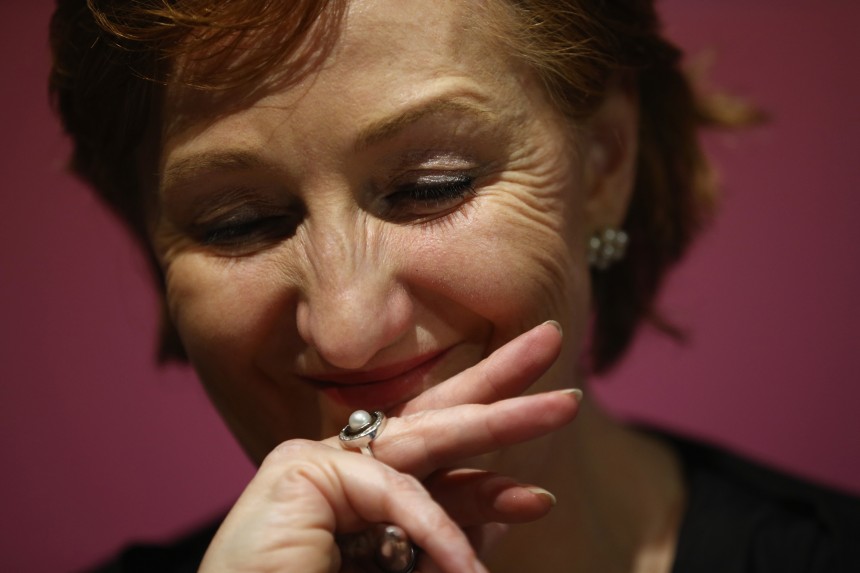
Suzanne Evans, Ukip’s Deputy Chairman, caused quite a stir on Today this morning with commentators tipping her as a possible leader.
Speaking clearly and calmly she said her part would save £32 billion from quitting the EU, slashing overseas air and scrapping Hs2 – a performance which left her trending on Twitter.
So who is Suzanne Evans?
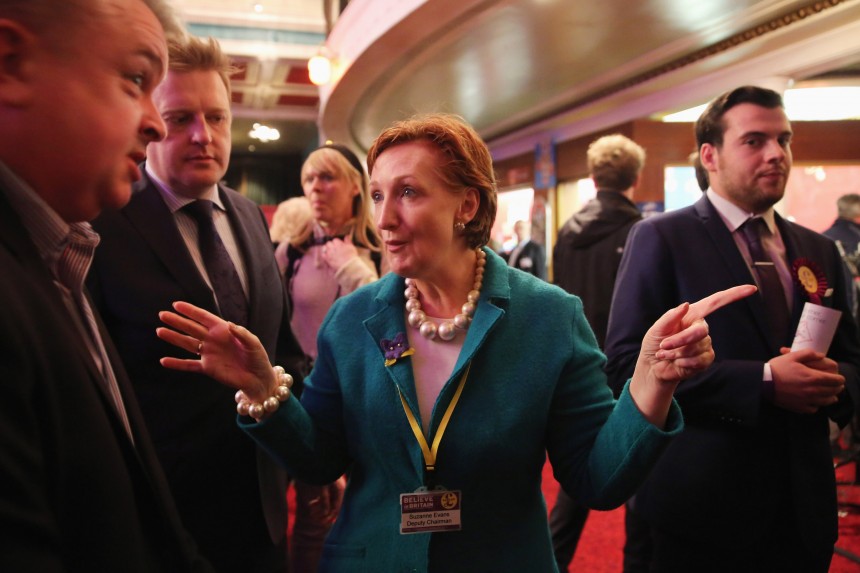
Ms Evans lost her seat at a councillor in the last round of local elections but is running for parliament this year.
She is a former Conservative who defected to the party two years ago quickly winning plaudits for assured performances in front of the camera – a skill set not every Ukip candidate boasts.
Ms Evans defected to Nigel Farage’s party in 2013 after the now infamous comments made a member of the Prime Minister’s inner circle who reportedly told journalists that the Conservative grassroots were “mad, swivel-eyed loons”.
“Better a clown than a swivel eyed loon. We are glad to be leaving the Tory circus,” she wrote at the time.
Two years on she is the most senior woman in the party. last week she joined Patrick O’Flynn, Ukip’s economic spokesman, to launch the party’s manifesto for women and she often appears on television to take part in debates or defend policies.
Although tipped by some as a potential successor to Nigel Farage she is not immune to a gaffe.
Last year she blamed Ukip’s poor performance in London (and the loss of her own seat) on “educated, cultured and young” in the capital who were less likely to vote for Ukip.
And only last week she said that immigrants were to blame for Britain’s housing crisis despite owning “two and third” homes herself. “My homes are both very modest and quite small really,” she told a press conference.
She has also said the fact that Ukip tended to be more popular among male voters was down to “pure propaganda” generated by the media and political rivals, although her own party colleague disagreed saying that Ukip has “sometimes resembled a rugby club on tour”.
She blamed Ukip’s poor performance in London (and the loss of her own seat) on “educated, cultured and young” in the capital who were less likely to vote for Ukip, and claimed the party was unlike the “metropolitan elite” in being able to understand the “heartache” felt by the rest of England.
Ms Evans is related to the William Morris “Billy” Hughes – Australian prime minister from 1915 to 1923 – who was famous for changing party five times, so it might be worth watching this space.
-
Labour: Allow grandparents to take a month off to look after their grandchildren
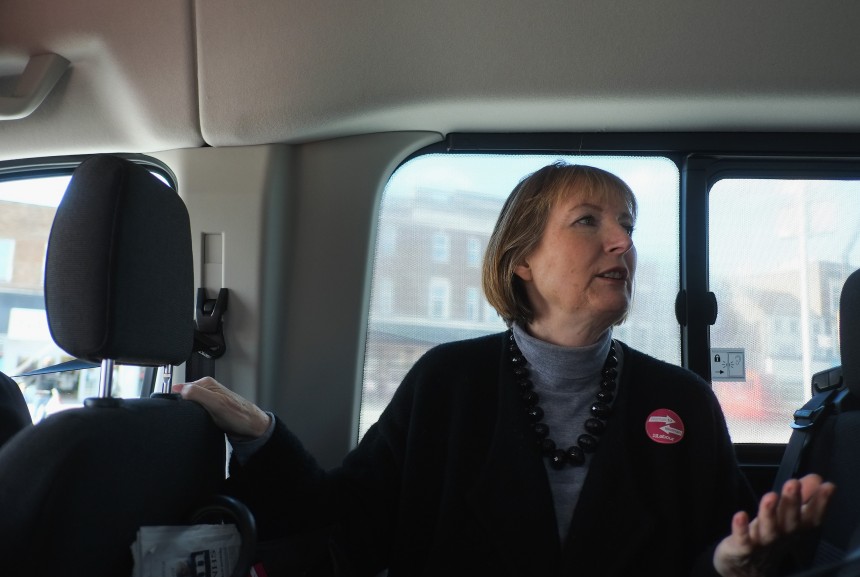
Harriet Harman campaigns on Labour’s ‘woman to woman’ bus
Dubbed ‘granny leave’ the Labour party has said it would introduce a new legal right to allow working grandparents to take time off to care for their grandchildren.
Harriet Harman, the party’s deputy leader, said that under a Labour government grandparents would be able to take up to four weeks unpaid leave each year.
Research suggests 1.9 million grandparents have given up a job, reduced their hours, or taken time off work to look after their grandchildren.
And more than half of mothers rely on grandparents for childcare when they go back to work after taking maternity leave.
The policy, which would require a change in the law, will be officially announced at Labour’s women’s manifesto launch today.
-
Lord Gus O’Donnell: ‘There is public foreplay, we shall see what is consummated’
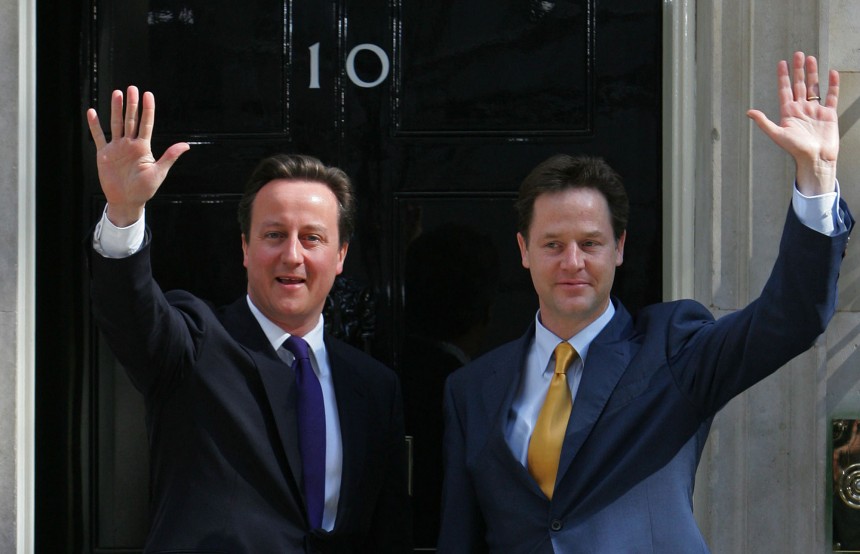
David Cameron and Nick Clegg in 2010
Lord Gus O’Donnell who served as cabinet secretary under three prime ministers and crucially during 2010s coalition negotiations has given a fascinating behind-the-scenes insight into the election.
While the world was focused on the famous joint press conference in the rose garden, five years ago, between David Cameron and Nick Clegg, thousands of civil servants were trying to figure out how to deal with an almost unprecedented scenario of a coalition government.
He says that there were not many people alive who had experienced one in Britain before – but, he adds, it was a “piece of cake” in comparison to what we could be left with on May 8.
The civil service, he says “will be preparing for all sorts of options, and this time round I think they will include minority governments and possibly some kind of mix, there could be a party in coalition with a second party but having a supply and confidence deal with a third party.”
“There is public foreplay, we shall see what is consummated”
O’Donnell says that the parties are already “signalling” to each other about what is important – they won’t commit to “red lines” but they say things like “this is on our front page” – for the Lib Dems this morning that is a substantial increase in education spending.
Coalition negotiation will take longer this time
It could be a complicated grouping with separate informal deals with other parties, or it could be that because coalition is more familiar parties will be more entrenched about what they want – but he predicts that whoever attempts to form the coalition will take longer thrashing out the deal this time around. He also adds that the Lib Dems and Conservatives know each other very well now and know what is important to whom.
Coalition could mean less laws
He adds that the civil service will be studying precedents and tactics for what worked in previous coalition governments which worked in the UK – although you have to go back to the 1940s to find them. He says: “What you are trying to do is to get to a stable effective government.”
Civil servants trying to serve complex coalition governments are loathe to go to the House of Commons with too many contentious issues so they try and find “other ways” of doing things. This he says could end up with fewer laws being made, no bad thing he says if they are fewer, but better thought through.
-
Lib Dem manifesto 150 pages long
By far the longest manifesto so far.
Pity us who have to actually read the whole thing: we’ll have highlights and analysis here for anyone who doesn’t quite have the time this morning.
-
Battle of the battle buses
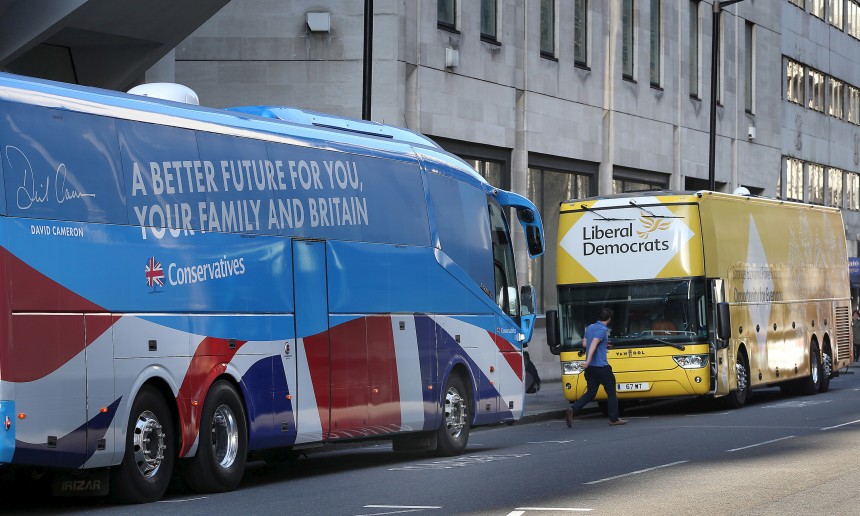
The Conservative party election bus faces the Liberal Democrat bus before a day of campaigning in London
-
Lib Dems launching their manifesto in a disco?
Great atmosphere here in Battersea as we prepare to launch our manifesto #GE2015 pic.twitter.com/8sayC8mBVt
— Liberal Democrats (@LibDems) April 15, 2015
-
Nick Clegg: ‘We did the gutsy thing and it was worth it’
Nick Clegg says that the Liberal Democrats did the “gutsy thing” and “stepped up to the plate” to put the country first, even thought it meant working with people they disagreed with and it meant that it would “take a hit to our popularity”
He adds: “Do you know? Every day has been worth it because we made Britain better.”
It gets a tepid clap from the disco-style venue in Battersea where the Lib Dems are launching their manifesto.
Gary Gibbon sends this panorama picture:

-
Nick Clegg: Kingmaker could be Alex Salmond, Nigel Farage or me
Nick Clegg says the era of one party Government is over. He says he is not denying that either Ed Miliband or David Cameron and he is offering himself as the clear choice instead of Nigel Farage or Alex Salmond.
“Ask yourself this: Do you want Nigel Farage walking through the door of No. 10? Do you want Alex Salmond sat at the cabinet table or do you want the Liberal Democrats.
“We will add a heart to a Conservative Government and and a brain to a Labour one.”
The room really liked that line.
Nick Clegg is talking very little so far about his policies and a lot about how terrible Nigel Farage would be for the country. he says he will cast aside shared British values.
He has also been saying Alex Salmond will be Ed Miliband’s SNP savior, not Nicola Sturgeon (who many people in England have rather warmed to since her widely applauded performance in the leaders debates). He says this is because Salmond is standing for parliament , and so he is the “one who wants to sit in Westminster to have his say over how the whole country is run”.
He says a Miliband/Salmond Britain will be “crippled with reckless borrowing”and the future of the United Kingdom would be in the balance again.
-
-
Ed Miliband: Standing against my brother was hard but we’re moving on
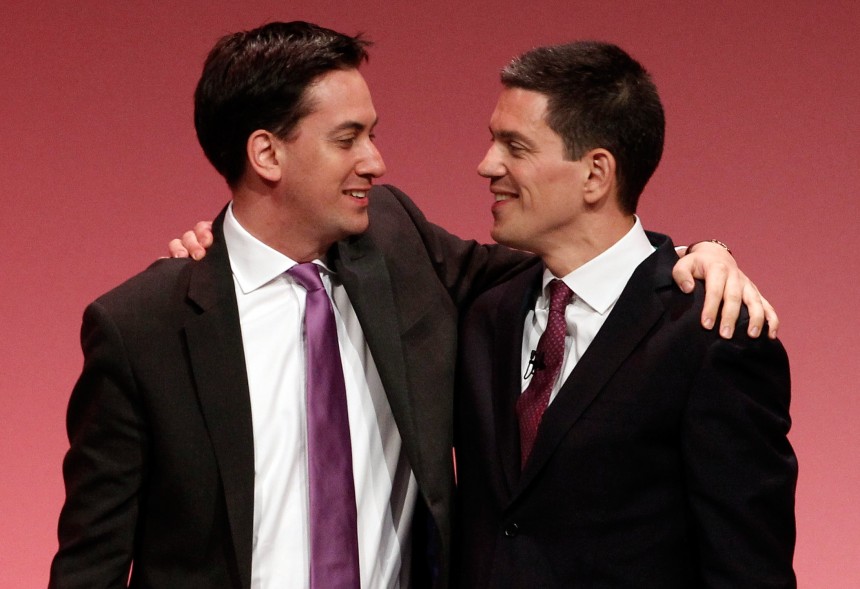
Brothers in arms? Ed and David at the Labour party conference in 2010
The Labour leader has been on Woman’s Hour where the conversation turned to accusations from Conservatives that Mr Miliband stabbed his brother in the back, or indeed the front.
He said that taking on his brother was a “hard” process but that the brothers are “moving on”.
“What drove me to it was a sense that the Labour Party needed to move on from New Labour. We offered different things to the Labour Party.
“I felt I was the person who would move us on best from New Labour. In the end the Labour Party made its decision and yes it was hard, absolutely it was hard. My mum’s a pretty stoical person, she had got through much harder things than that. We’re moving on, David and me. He’s got a great job in America.”
-
Labour’s response to Nick Clegg’s manifesto launch
In case you’re wondering whether Nick Clegg’s promises are worth listening to: pic.twitter.com/UleNklLgAT
— Labour Press Team (@labourpress) April 15, 2015
-
Nick Clegg: Ukip’s Liver?
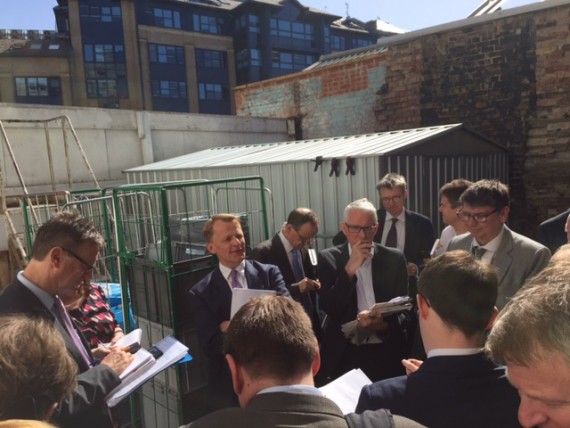
Meanwhile Gary and other political hacks are being briefed by the bins
A text just sent to me by a distinguished public figure who wishes to remain anonymous: “The Lib Dems will add a heart to a Conservative government and a brain to a Labour one…. and a liver to a UKIP one.”
-
Operation Black Vote launches in London
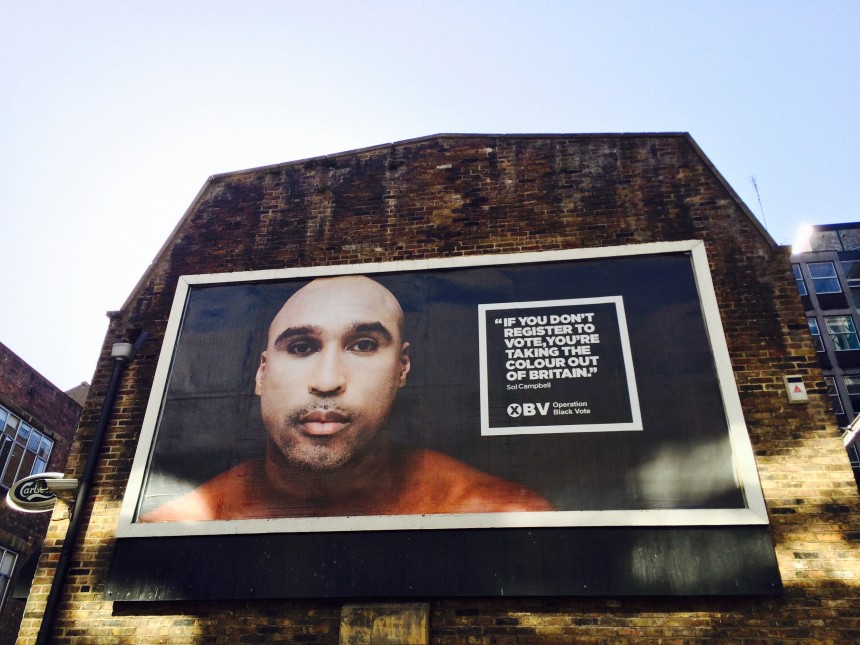
Meanwhile in London Operation Black Vote is launching a campaign to encourage more black people to go out and vote in May.
The hard hitting posters show pictures of black celebrities drained of colour with the slogan “If you don’t register to voter, you’re taking the colour out of Britain.”
Nelufar Hedayat reports:
These are the bill boards that will be going up in city centres around the UK encouraging black and ethnic minority voters to get out and vote on election day next month.
Celebs like Tinnie Tempah and sol Campbell will appear beside the slogan to encourage more black voters to demand equality and justice through “political clout”.
The point of the campaign is using shock tactics to not just talk about politics but take part in the political system. It has had the strong backing of Magnus Djaba, the head of Saatchi & Saatchi UK. It’s central theme is: Black votes matter.
Simon Wolley, head of Operation Black Vote, told Channel 4 News: “Black people are no longer seeking to ask for equality and justice now they can demand it with political clout.”
Labour MP Diane Abbot has appeared alongside Homeland star, David Harewood giving support for the campaign.
-
Gary Gibbon’s verdict on the Lib Dem manifesto launch
We are in the “Testbed1” creative space, adjoining the Doodle Bar in Battersea, south London, and the Lib Dems say it’s the perfect place for their manifesto launch. It looks like a rave venue to me, but I am no expert. Here’s the view.
Nick Clegg began his manifesto launch with attacks on Ukip and the SNP. Decency and tolerance would be cast aside if Ukip got a share in power with the Tories. Alex Salmond, who he said was the man really in charge in the SNP, would jeopardise the UK if Labour did a deal with the SNP. Only the Lib Dems could be trusted as a coalition partner, he said.
The front page of the manifesto has five rather than the four “priorities” for government on the front cover in 2010. “Priorities” with front page billing is code for “red lines”, David Laws all but admitted on Radio 4 this morning. Nick Clegg called them the promises Lib Dems would “fight tooth and nail for in the next parliament”.
The priorities expressed as slogans – “prosperity for all” etc – are not things that a Tory or Labour leader would struggle to agree with but Labour might not be thrilled with raising the personal allowance to £12,500 as a priority and the Tories might baulk at the Lib Dems’ green laws.
Read the full analysis here
Lib Dem manifesto in full here
-
Nigel Farage makes his pitch to the ordinary grafters of Britain
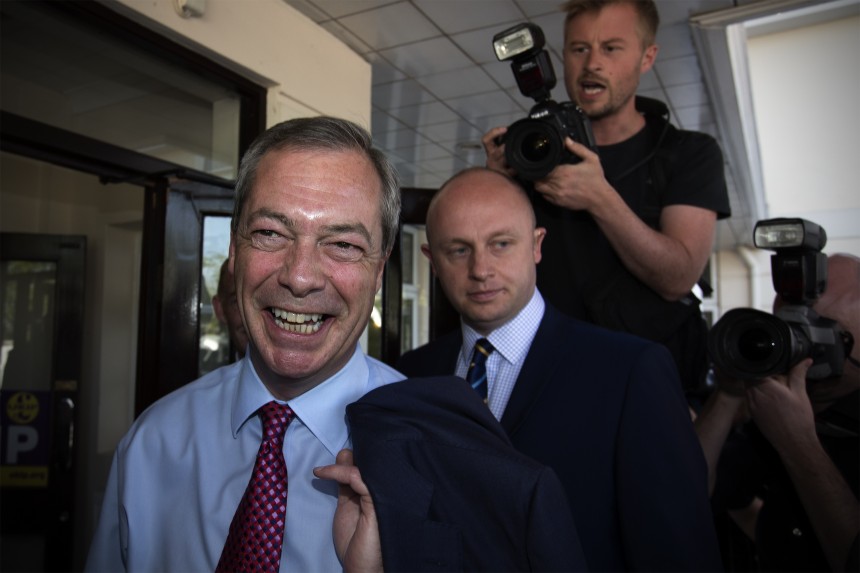
Nigel Farage arrives at today’s launch
Nigel Farage has been speaking in Thurrock. Unlike Nick Clegg he’s straight into polices on the EU and immigration. This manifesto, he says, is entitled Believe in Britain but it could be titled “believe in the British people”.
He is pitching for the 5 million “ordinary” people who run their own business. He wants to “unleash” economic dynamism by raising 40 p tax, end tax for those on minimum wage, add a new £35,000-£50,000 a year tax band and ending inheritance tax.
The Ukip leader says under the current government the rich have got richer and the poor have got poorer, with corporate business running the political agenda.
He says he is offering an £18 billion tax-giveaway and that ‘history’ has shown that will unlock and economic boom. It will be funded he says by dramatic slashing aid budgets,ending Eyu contributions and stopping “vanity projects like Hs2.
The Ukip manifesto pledges have been independently verified by the thinktank CEBR which he says no other party can match. Mr Farage is making much of this and says all party’s should be held to the standard of having an independent audit on their spending.
Nigel Farage says 5 years is a long time in politics and an aeon in terms of Ukip. he congratulates Suzanne Evans and her team for producing the “excellent manifesto”.
Suzanne Evans has been speaking for longer than NIgel Farage, which commentators are suggesting is the party putting her forward and a possible successor. I profiled her earlier today.
READ UKIP MANIFESTO IN FULL HERE
-
Ukip heckle journalist asking about lack of black faces in their manifesto
A journalist from The Telegraph has been booed and shouted down when he asked Nigel Farage why the only black face in the Ukip manifesto is on the page about international aid – which the party intends to cut.
Christopher Hope said he was inspired to ask Mr Farage about the lack of black faces in manifesto after Channel 4 News’ Michael Crick was hit over the head by former Ukip member Godfrey Bloom for raising a similar question.
Ukip say that after the question was asked ‘dozens’ of black, Asian & ethnic candidates stood up around him.
Interestingly, among all the other Ukip faces featured in the manifesto, there is one clearly missing – Mark Reckless, one of Ukip’s two MPs, who did not turn up to the manifesto launch either.
Here are all the Ukip politicians featured in the manifesto:


-
Inspired by Michael Crick…
Tim Bouverie, political producer, has sent this update from Essex:
Chris Hope got booed and jeered at with cries of shame from Ukip audience when he pointed out that there was only one black face among all the photographs in the manifesto, and that that face was on the international aid page, funding for which Ukip is planning to cut.
After this about half a dozen black and ethnic minority candidates stood up and started heckling him along with the rest of the audience. This went on for about a minute.
The last time a journalist was asked about the lack of black faces in Ukip literature he was hit on the head with the party document. That of course was our very own Michael Crick. Indeed Mr Hope said he was inspired to ask the question by the treatment Michael got when he risked it last time.
Unusually for a Ukip event, Michael was called on first by Ukip deputy Paul Nuttall, to ask a question. He said they would start with Michael, because, to quote a phrase used by another political party: “Things can only get better”.
Cue large cheers for Michael. The man Ukip love to hate.
-
Why is it OK to boo journalists asking difficult questions?
Before Ed Miliband dared to take a question from Britain’s media on Monday he had to issue a warning to his party. Don’t boo the journalists, they are just doing their job.
Nigel Farage didn’t make any such warning today before his aides and supporters drowned out a journalist asking a probing question about why the only black face to feature in the party’s manifesto was on the international aid page.
It seems odd to have to explicitly tell the audience at a political hustings, a press conference, a public speech, that journalists are allowed to interrogate what is being said, even if you don’t agree with what they are asking about. However at many public events being asking a question as part of a national media organisation does not go down well.
When I was in the lobby I went to dozens of speeches and have been booed at, hissed at and berated for doing my job numerous times. Although admittedly never with quite so much gusto as Ukip managed today.
It’s not just me – the BBC were chased around with billboards in Glasgow during the referendum, Channel 4’s own Michael Crick was knocked on the head with a newspaper for asking an awkward question and I once saw a very confused FT journalist being berated at a public Ed Miliband speech.
He hadn’t even asked the question which caused the ire, he was just sat in the wrong bit of the audience.
-
Ukip: We have christened it the Michael Crick question
Patrick O’Flynn, Ukip’s economic spokesman, has been on the World at One to explain the incident at the manifesto launch earlier when a journalist was booed for asking a difficult question.
He said the query, about why there were so few black faces in the Ukip manifesto, should be “christened the Michael Crick question”.
In 2013, Godfrey Bloom, who has since left Ukip, was filmed hitting Channel 4 Political Correspondent Michael Crick over the head with a Ukip conference brochure, after he was asked why there were no black faces on its front cover.
Mr O’Flynn said that while the journalists are perfectly entitled to ask difficult questions he was “delighted” that black and ethnic minority candidates had stood up in “answer” to it.
Mr O’Flynn, who used to be the political editor of the Daily Express, said that activists of all party stripes boo and hiss journalists, and sometimes hacks just have to have “thick skins”.
He added that he tries to tell Ukip’s ‘true believers’ that journalists are just doing their jobs, but sometimes it is difficult to control.
-
Is Cleggmania back?
-
Nick Clegg says put the burden on the richest, but who is hurting from efforts to reduce the deficit
Neil MacDonald, economics producer, has been crunching the numbers on Nick Cleggs’ claims on the deficit earlier today.
Responding to a question about who should bear the burden of reducing the deficit, Nick Clegg said it should be spread as evenly as possible but it should start with the richest.
IFS analysis of the Coalitions changes cast doubt on whether either of those ideas were achieved by the Coalition.
This chart shows the impact of all the tax and benefit changes (excluding Universal Credit reform) implemented since April 2010.
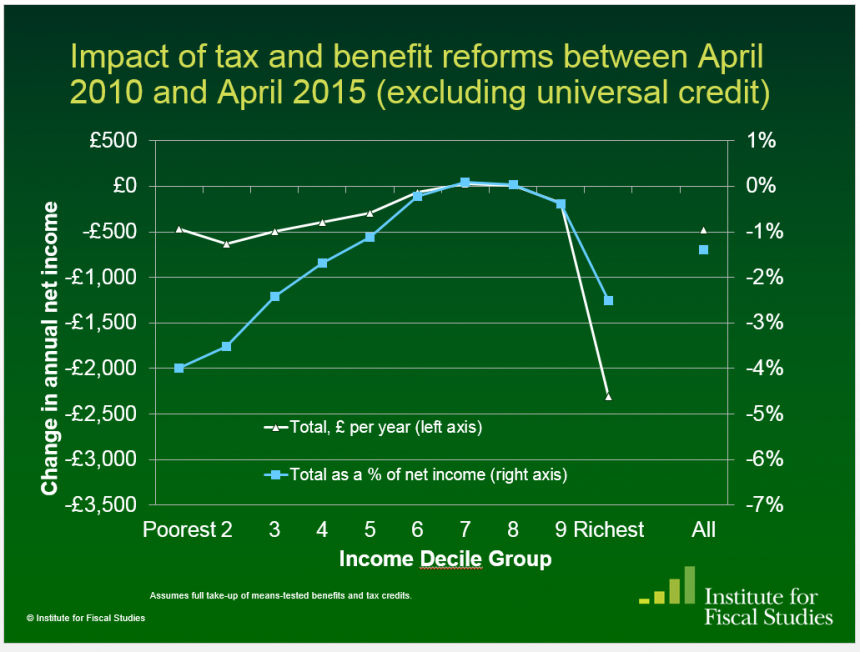
Two points I’d note:
The white line shows the cash lost by each income decile of the population. The top 10% have lost the most in cash terms (as Mr Clegg would want) but the next biggest losers in cash terms are the bottom three income deciles. They have all been hit by the squeeze on benefits. Bizarrely, people in the 7th and 8th income deciles have basically got away with no loss at all*. They’ve been helped in particular by the Lib Dem signature policy of raising personal allowances.
The blue line shows the same thing in a slightly different way – it shows the cash lost as a percentage of that group’s income. This is worth looking at because £500 a year lost by the poorest tenth of the population can matter more to them than £1,000 lost by the richest tenth. Here, the biggest losers are the bottom twenty percent of the population – they lost a bigger share of their income than even the top ten percent. Again, the people in the upper middle are the big winners on this analysis.
*To get into the 7th decile of income distribution, a single person would have an income of £18,338. A couple with one child would need an income of £37,352.
-
Lib Dem battle bus breaks down, again
The Lib Dem battle bus has broken down again. Last night it broke down in Brixton and today bad luck stuck again as it ground to a halt in Haringey, North London and Nick Clegg was on board.
The Liberal Democrat leader was whisked away by special forces stranding journalists in Crouch End.
Last week a bus hit a pigeon on the way to a campaigning event.
-
Could single parents swing the election?
The outcome of virtually all the 100 most marginal seats in England and Wales could be decided by single parents, showing the importance of policies such as childcare costs and flexible working, according to a new report.
Gingerbread said that in 96 seats, the number of single parents outweighs the majority at the last election.
Another reason why the parties are falling over each other to please parents – Labour are offering 25 hours of free childcare and unpaid leave for grandparents, the Conservative say they’ll give parents 30 hours. Liberal Democrats want to invest billions more in education for under 19s. Ukip say they will make it a statutory duty for all primary schools to offer before and after-school care from 8am to 6pm .
-
Policies you may have missed from the Ukip manifesto
Statutory after school clubs A statutory duty on all primary schools to offer before and after-school care from 8am to 6pm during term time, with the option to extend this to all-day provision throughout the school holidays.
GPs in A&E Put GPs on duty in A&E departments seven days a week
Free parking at hospitals invest £200 million to make parking at English hospitals free for patients and their visitors
Cold-calling UKIP will make it a criminal offence to cold call someone in respect of their pension arrangements.
Child Benefit Limiting child benefit to two children for new claimants
50/50 child custody UKIP will legislate for an initial presumption of 50-50 shared parenting in child residency matters.
First aid Make First Aid training a statutory part of Personal, Social and Health Education
Parent power Additional investigations by Ofsted if 25 per cent of parents or governors present a petition to the Department for Education.
Right to Buy Ukip will not allow non-British nationals access to the Right to Buy or Help to Buy schemes, unless they have served in Her Majesty’s Armed Forces.
Classic cars To help protect the enduring legacy of the motor industry and our classic and historic vehicles, UKIP will exempt vehicles over 25 years old from Vehicle Excise Duty.
Business Allow British businesses to choose to employ British citizens first.
Animal cruelty Triple the maximum jail sentences for animal cruelty and torture
Smoking rooms in pubs Amend the smoking ban to give pubs and clubs the choice to open smoking rooms provided they are properly ventilated and physically separated from nonsmoking areas.
End subsidised food and booze for MPs
Ceasing all subsidies for bars and dining rooms in the Palace of Westminster
-
Nigel Farage – A Man For All Seasons?
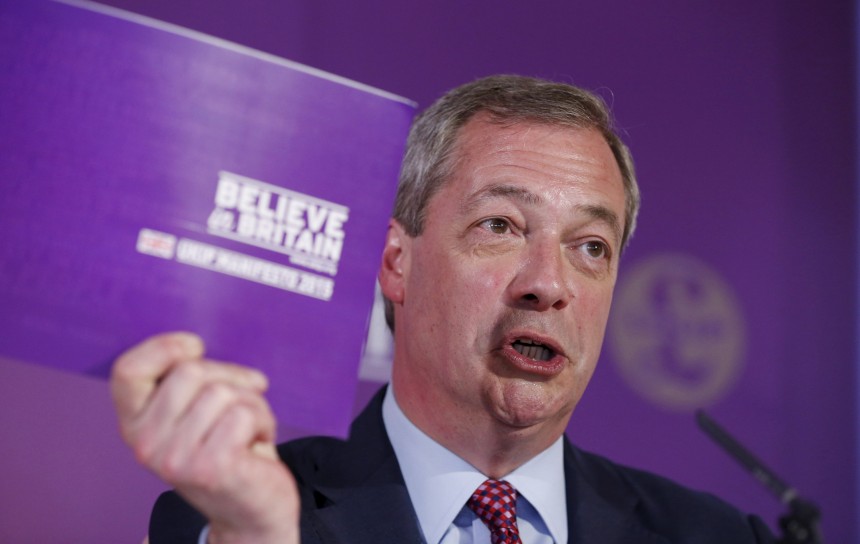
Tim Bouverie, political producer, sends his assessment of Ukip’s big day – and how the party’s leader is faring in the face of falling polls.
Paul Nuttall, UKIP’s deputy leader, introduced Nigel Farage today as, “the man who cuts across class boundaries”.
Is this true? Well, to a certain extent, yes.
Though many people loathe him, you would be hard pressed to divide Farage’s detractors and supporters along class lines. He has the backing of hedge fund managers, who want to leave the EU and blue collar workers who are worried about immigration. He is at home drinking champagne but is also the only politician most voters could imagine going for a pint with.
This broad appeal was in display today in Thurrock – one of Ukip’s key target seats. Not everyone wants Nigel Farage to be prime minister – one woman didn’t think he would be able to take the strain – but otherwise almost everyone we spoke to, from a variety of backgrounds, had something positive to say about the Ukip leader.
The other leaders are “all the same”, trotting out their pre-scripted, focus-group-honed, soundbites. Farage, by contrast, is off the cuff (he rarely speaks from a script), straight talking and, for many, attractively un PC.
In a word: authentic. And authentic cuts through class and traditional loyalties.
-
If we leave the EU what will we still have to pay them?
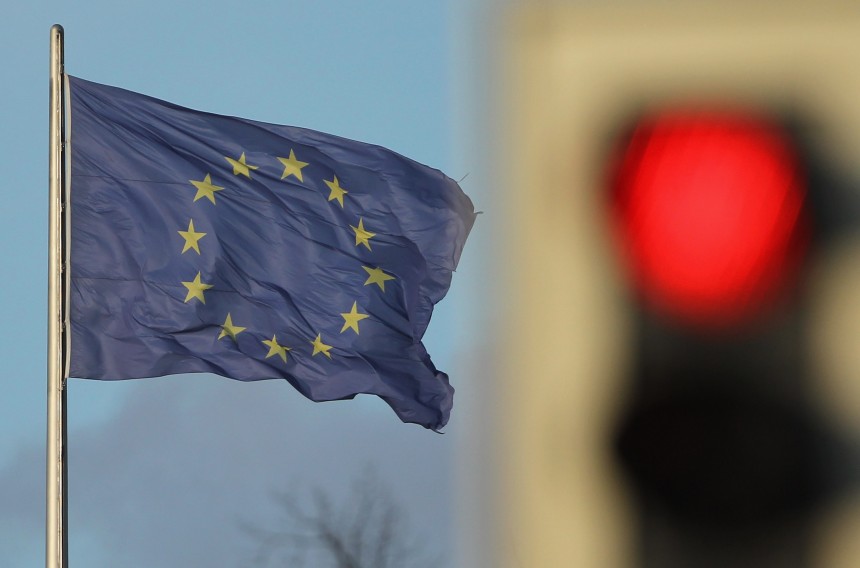 Neil MacDonald, economics producer, explains:
Neil MacDonald, economics producer, explains:A key element of the savings UKIP sets out in its manifesto is the £9bn of net contributions we make to the European Union each year. But that assumes we’ll pay the European Union nothing if we leave and that seems unlikely. Both Norway and Switzerland are outside the EU but still pay into its budget. The question is: how much would the UK have to pay?
One way of estimating this is to look at what Norway pays in. You can see the detail here.
In 2013, Norway paid E296m into the various EU programmes it participated in. It also contributed to grants of around E347m designed to reduce economic disparites within Europe. That makes E643m a year. There’s another programme that costs about E150m a year but that doesn’t go directly through the EU budget so perhaps we should ignore that. There’s also more (though smaller) contributions in the area of justice, home affairs and regional co-operation.
Would the UK be expected to pay these sorts of contributions as well? Probably, because part of the justification for Norway making payments is that it benefits from access to the European Single Market. UKIP wants to do the same through a negotiated trade deal.
Its hard to know how the E650m a year Norway contributes would translate into UK terms but its worth noting that our economy is five times the size of Norway. So it doesn’t seem implausible that the UK might be facing an annual payment in the region of one or two billion pounds. The reality is that the final deal will depend on a long and probably difficult negotiation with the European Union.
UKIP can rightly point out that there should still be big savings – but assuming its the full £9bn a year seems very optimistic.
-
FactCheck: do Ukip have the most credible manifesto?
“I believe what we have done with this document is to set a new gold standard for how manifestos in this country should be produced.” Nigel Farage, 15 April 2015
Nigel Farage famously described Ukip’s last general election manifesto as “drivel”.
This time there was a ringing endorsement from the leader of the party’s programme for government.
So does it add up? Read FactCheck’s brilliant analysis here
-
Lib Dem collapse in their heartlands
It’s just one poll but this will be tough reading for the Lib Dems.
-
Harriet Harman is discussing Ukip’s women’s policy
She seems unconvinced that they even have one. They do, Suzanne Evans and Diane James launched it last week.
-
Mediterranean migrant deaths: where British parties stand
Ukip says rescuing migrants off Europe “may actually be making matters worse”, while the Tories want to “dissuade migrants from making these perilous and illegal journeys in the first place”.
Since Friday, 8,500 people have been rescued from the Mediterranean after trying to sail from the north African coast, according to the UN Refugee Agency.
The numbers are expected to climb rapidly, with EU border agency Frontex predicting that over 500,000 people are waiting to set sail from Libya over the summer, but migrants are likely to use other routes too.
This is the challenge facing Italy and other EU countries including the UK, which have proved prime destinations for migrants in the past – so where do the UK’s main parties stand?

-
A typical Ukip manifesto launch…
“Radically cutting the foreign aid budget”, exiting the EU and scrapping HS2 – that’s how Nigel Farage says Ukip will fund its manifesto pledges.
And it was a day of fun and games at the manifesto launch – with a Telegraph journalist booed for asking why there is only one black face in the manifesto – on a page about overseas aid – and one man gave an unusual explanation as to why he is voting Ukip to Political Correspondent Michael Crick.
Watch the report:
-
Was Mark Reckless reckless to leave the Conservatives?
Nigel Farage didn’t answer a question earlier on why there was only one black face in Ukip’s manifesto (on a page about overseas aid).
Did Jon Snow get any more luck with Mark Reckless, Ukip’s candidate in the constituency of Rochester and Strood?
The other candidates standing in Rochester and Strood are as follows:
- Prue Bray Liberal Democrats
- Daniel Burn Trade Unionist and Socialist Coalition
- Clive Gregory Green Party
- Naushabah Khan Labour Party
- Mark Reckless UK Independence Party (UKIP)
- Kelly Tolhurst Conservative Party
-
Is the Lib Dem manifesto ‘so much dead forest’?
Political Editor Gary Gibbon asks Nick Clegg if documents like the Liberal Democrat manifesto are “so much dead forest” because policies will end up being scrapped if the party is in coalition again after the 2015 general election.
Mr Clegg responds that “last time… three-quarters of the policies in the Liberal Democrat manifesto made its ways into the coalition agreement”.
Watch the interview:
-
What would parliament look like under Proportional Representation?
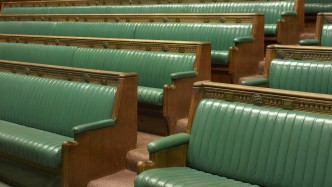
-
Become a party leader with your webcam

-
Are we richer than five years ago?

-
A clubby, chummy, synthetic encounter with Cameron

-
The Greens win: what changes?

-
The dodgiest claims of the election campaign

-
Does the Sun win elections?

-
Is Britain getting full?

-
Will the SNP storm to victory?

-
A ‘pumped up’ David Cameron

-
Ed Balls on Russell Brand and economic growth figures

-
Which party is running the biggest truth deficit?

-
The real superfight: Prescott vs Crick

-
Profile: Ed Miliband

-
Will the NHS survive?

-
Is St George now trying to slay the Sturgeon dragon?

-
Profile: Nick Clegg

-
Are a million people using foodbanks?

-
The opposition leaders’ debate in 5 minutes

-
Profile: David Cameron

-
When Nigel Farage met TOWIE’s Joey Essex

-
How many non-doms are dodging tax?

-
The ten teenagers running for parliament

-
Nigel Farage turns on the audience at BBC debate

-
Profile: Nigel Farage

-
The Tories’ right to buy plan

-
Do Ukip have the most credible manifesto?

-
What David Cameron & Ed Miliband like about each other

-
Where has it gone wrong for George Osborne?

-
Debate: the ethnic minority vote

-
Do Labour’s sums add up?

-
Tony Blair, the election and the brand

-
Did everyone forget about foreign policy?

-
Tony Blair and Ed Miliband: how they compare

-
Leaders’ debate highlights: seven way battle

-
Paloma Faith: ‘Russell Brand is wrong.. we need to vote’

-
Jon Snow: Political exuberance in Scotland, indecision and indifference elsewhere

-
Is the BBC picking on Ukip?

-
Labour scornful of Osborne’s good news ‘topping’

-
Cameron’s blind spots on zero hours and food banks

-
Has the mental health budget been cut?

-
What’s wrong with our MPs?

-
Scottish engagement vs rest of UK

-
“Hell yes, I’m tough enough”

-
Krish cycles the election trail: young versus old

-
How alcohol and politics mix in the corridors of power

-
Pub Landlord election stunt fails to take off

-
Marmite and fruitcakes: Ukip activists in their own words

-
What have the Liberal Democrats ever done for us?

-
MPs’ expenses: 46 claim in London despite owning a property




